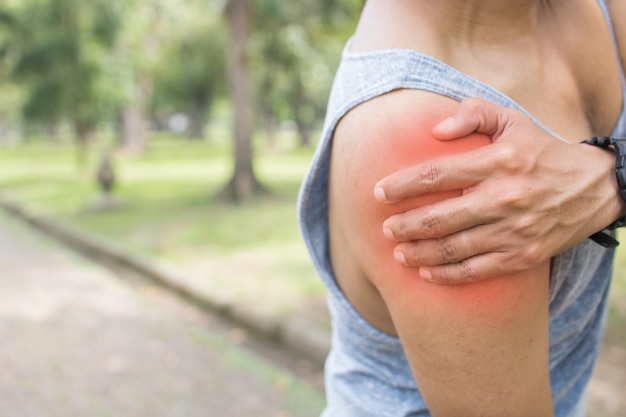Around the rotator cuff consists of the upper arm bone (humerus), the collar bone (clavicle), and the shoulder blade (scapula) make up the shoulder joint. The humerus has a ball shape at the end which fits into a concave surface in the scapula creating a ball and socket joint.
This type of joint allows the shoulder to have a lot of mobility and therefore creates the optimal mechanics for the arm to move through a variety of different positions. These bones are supported by muscles, tendons, and ligaments.
A rotator cuff is a group of 4 muscles: supraspinatus, infraspinatus, teres minor, and subscapularis. These muscles work together and coordinate and control the shoulder joint to provide stability to the joint while the arm is moved in space.
Since the shoulder moves through a wide range of movements, it is very common to experience shoulder injuries.
Rotator Cuff Injury
Injuries to the shoulder may impact our ability to participate in activities of daily living. The rotator cuff muscles are used frequently and can be injured in a variety of ways.
One mechanism of injury can be due to a fall onto an outstretched arm or onto the shoulder. Additionally, it can occur from damage due to forceful trauma or impacts in the shoulder region.
Alternatively, repetitive activities, especially those occurring over shoulder height or overhead may place continuous stress on the surrounding soft tissues of the shoulder including the rotator cuff.
During repetitive movements, some muscles in the rotator cuff may be used more than others which will result in some tightness in those muscles and relative weakness in other muscles which can create an imbalance that alters the position of the bones and can also contribute to dysfunction and damage with repetitive use.
As these muscles continue to be used in this manner small micro-injuries can occur in the muscles and tendons and can result in inflammation, bursitis, calcification of the tendons and potentially lead to partial or full-thickness ruptures. As a result of the damage, the shoulder may be more unstable and less able to be used in the same way as before.
Rotator Cuff Tear Classification
The tearing and trauma that occurs within the rotator cuff during an instance of a single trauma or repetitive trauma can be classified into partial-thickness or full-thickness tears.
- A partial-thickness tear refers to those injuries where only some of the fibers in the muscles and tendon have been torn or damaged.
- A full-thickness tear occurs when the entire muscle or tendon has completely torn. The pain can also be classified as tendinitis when the trauma results in inflamed tendons or bursitis when the surrounding bursa (fluid-filled sacs that protect the tendons) become inflamed.
Some sports such as baseball, racquet sports, swimming, and weight lifting require many overhead and repetitive motions at the shoulder and may put the rotator cuff at additional risk of dysfunction.
Even if you are not participating in sports, the rotator cuff can be impacted by repetitive overhead activities, reaching, lifting, pushing, and carrying which may occur in your daily activities or as part of your occupation.
When experiencing a rotator cuff injury, you may have pain at the front or side of your shoulder. The pain may be aching in nature and may cause pain at night or when trying to sleep on the sore side.
It may be difficult to move your arm away from your body, reach overhead, lift different objects, or comb your hair. The way your shoulder pain presents and the specific tasks that are affected depend on which muscles and tendons have been impacted.
Book an appointment for Frozen Shoulder Physiotherapy in North Vancouver
Regardless of if your shoulder pain is due to a forceful impact or repetitive wear and tear, physiotherapy is an excellent option to help you address your injury.
During the appointment, we will provide an assessment that is individually tailored to your shoulder. This will include gathering a detailed history from you and spending some time to identify any underlying causes of your shoulder pain and rotator cuff dysfunction.
From there we will perform a detailed assessment of your shoulder and may also look at your neck, elbow, and wrist to determine if these areas are contributing to your pain or altered shoulder mechanics. This process will allow us to determine the cause of your rotator cuff dysfunction and help us to develop a rehabilitation plan that is tailored to your specific individual needs.
Depending on the cause and severity of your rotator cuff injury, we may use physiotherapy treatment techniques such as manual therapy, Intramuscular stimulation (IMS), education, postural training, load management and exercise therapy.
The exercise therapy will be focused on maintaining and improving mobility and additionally strengthening the rotator cuff, other muscles surrounding the shoulder and in the upper back region.
Depending on your symptom severity and the degree of the injury at the rotator cuff, the recovery time will vary. Those who have milder symptoms, and some initial inflammation should expect to see improvements within 6 weeks. Those who have experienced shoulder pain over a longer period and have more damage in the region or partial thickness tears should expect to see improvements within 6-12 weeks depending on how you respond to treatment.
In some cases, surgery for the rotator cuff may be required which will prolong recovery time and your physiotherapist can help to walk you through the decision-making process, the pre-surgery rehab, and the post-surgery rehab.
By understanding the orthopedic and biomechanical underpinnings of how the body works, we can selectively employ the right techniques and create a sustainable and effective care plan to help you get your rotator cuff back to full, pain-free functioning and participating in the things and activities that you love.
Call or go online to book an appointment for your rotator cuff pain with Cypress Physiotherapy and Health in North Vancouver.


:max_bytes(150000):strip_icc()/the-rotator-cuff-2696385-FINAL1-474e476cc4554dbd97995610f4402577.png)
